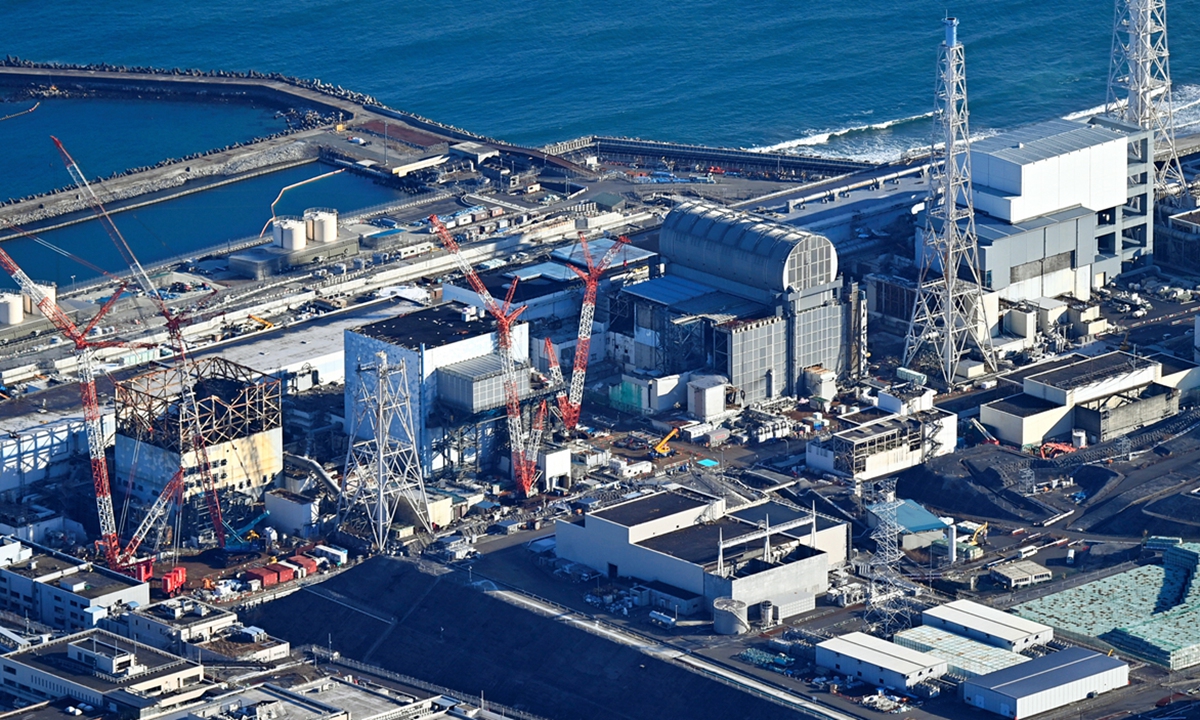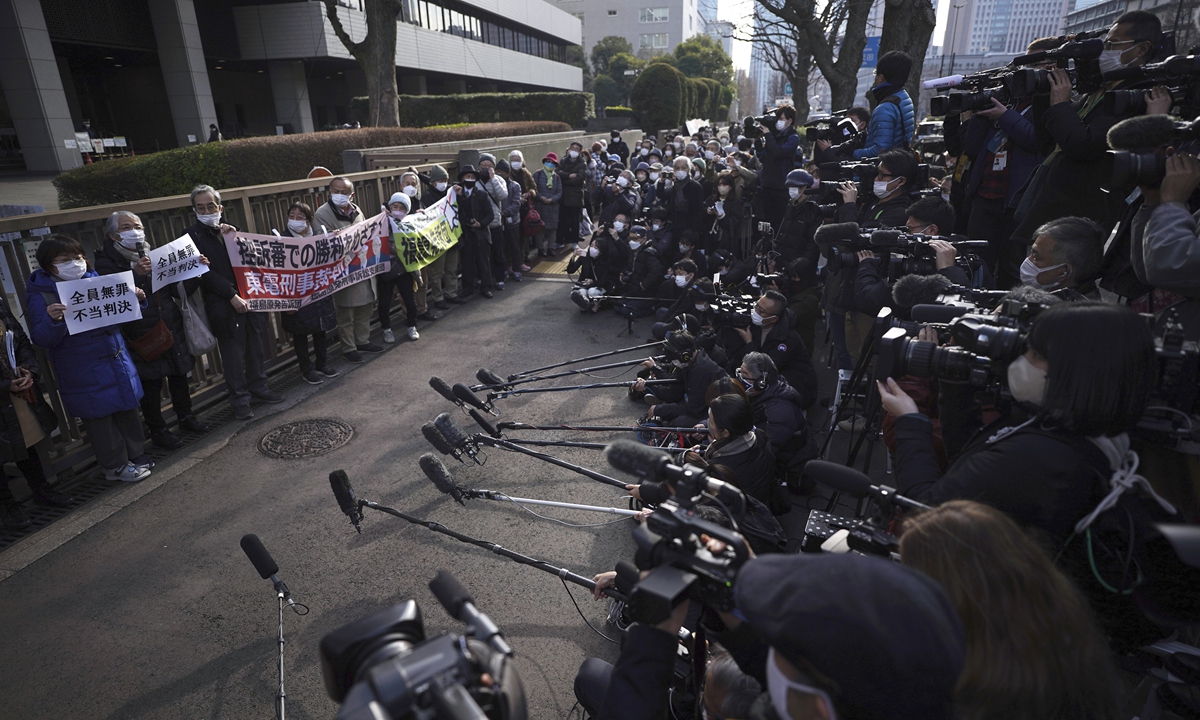
Damaged reactors are seen at TEPCO's Fukushima Daiichi Nuclear Power Plant on January 19, 2023 in Okuma, Fukushima. Photo: VCG
Editor's Note:In the face of the outcry from the international community, serious concerns expressed by neighboring nations, and strong opposition even from Japanese society, Japan remains committed to carrying out its plan to dump nuclear-contaminated wastewater into the Pacific Ocean. This irresponsible and selfish decision has drawn widespread criticism which the Japanese government has chosen to ignore. In this series, the Global Times will closely look into how this decision was made, what impact it will have on the environment and people's health, as well as the political deals made and lobbying work done by the Japanese government in Western countries.
In this third and final installment, the Global Times has conducted a comprehensive investigation into the PR stunts the Japanese government and the Tokyo Electric Power Company (TEPCO) are using in an attempt to gain further endorsements from abroad on the planned dumping of nuclear-contaminated wastewater.
Lobbying abroad and brainwashing at home" - the Japanese government and the TEPCO are employing a combination of PR stunts to gain further indulgence from the US-led Western clique and other stakeholders across the world while at the same time continuously increasing efforts to quiet down the opposition against the dumping plan.

Some Japanese residents protest against the acquittal of three former TEPCO executives after a second trial over the 2011 Fukushima nuclear meltdowns, outside the Tokyo High Court on January 18, 2023. Photo: VCG
Japan has spent a tidy sum annually on PR expenses on efforts to whitewash its image at home and abroad, especially over plans to dump nuclear-contaminated wastewater, since the country announced the plan in April 2021.
According to the 2023 budget document published by Japan's Ministry of Economy, Trade, and Industry in August 2022, such PR expenses stand at 2 billion yen (around $16 million). The 2021-budget document also showed that PR expenses were 2 billion yen, over four times those from the previous year.
The money has been used to "strengthen the effective dissemination of information to eliminate reputational damage and concerns that persist in Japan and overseas," read the document.
Chinese observers believe that the PR expenses accumulated by the Japanese government are an admission of guilt. If the wastewater were safe, Tokyo wouldn't need to conduct such a big PR campaign. The reason Tokyo would do so is because it also doesn't even know for sure whether the wastewater is safe or not, Chang Yen-chiang, director of the Yellow Sea and Bohai Sea Research Institute at the Dalian Maritime University, told the Global Times.
In the comment column under a news report by Nippon TV over the water dumping issue, many Japanese netizens expressed their deep concerns over the wastewater and its harm to health.
"If you [the Japanese government and TEPCO] insist on releasing the water, first of all, let the grandchildren of the government officials, the executives of TEPCO live in the area, and then talk to the local people that it [the nuclear-contaminated wastewater] is absolutely safe, and the cute grandchildren of the executives and officials have delicious fresh fish from the ocean [with the nuclear-contaminated wastewater]," read a comment in Japanese.
Lobbying the West
One of Japan's latest moves to seek for international support was through an attempt to include phrases stating that the Group of Seven (G7) members "welcome" its approach toward the nuclear-contaminated wastewater in a G7 document.
But the just-concluded two-day G7 Ministers' Meeting on Climate, Energy, and Environment has seemingly squashed Japan's hope of securing unanimous support from the G7 for its planned wastewater dumping after Germany voiced opposition.
Also, top Japanese officials have tried hard to hijack the Sapporo ministerial meeting as a face-to-face lobby opportunity.
In the meeting with EU Commissioner for Energy Kadri Simson, for instance, Japanese Economy, Trade, and Industry Minister Yasutoshi Nishimura lobbied for the early removal of EU restrictions on Japanese food product imports imposed after the nuclear power plant accident, the Japanese Ministry tweeted on Saturday.
Some observers are uncertain as to whether the joint statement of the G7 summit in Hiroshima, Japan scheduled in May might add phrases such as declarations that the G7 members "welcome" Japan's water dumping approach.
Whether Germany's lead in opposing such a move will embolden others to follow remains unknown, Chang said.
Whether the individual head of G7 nation members succumbs to the US-led clique pressure and indulges the Japanese wastewater dumping plan will also have to be subject to further observation, Chang noted.
Liu Jiangyong, vice dean of the Institute of Modern International Relations at Tsinghua University, told the Global Times that Japan will surely ask for support from other G7 member states over its dumping plan during the G7 Summit in May, but a formal agreement could be difficult to reach.
The US has apparently indulged Japan over the plan. Noting that the US is aware that the Japanese government examined several options related to the management of the radioactive wastewater, the US government in April 2021 claimed that Japan has been "transparent about its decision" and "appears to have adopted an approach in accordance with globally accepted nuclear safety standards."
China, along with Russia, presented a joint list of technical questions to Japan in November 2022, but Japanese officials have obfuscated by either distorting concepts, evading the crucial points of concern in items of information, and through outright refusal to discuss the matter.
Weakened opposition raises concernWith the intended spring or summer dumping of the nuclear-contaminated wastewater fast-approaching, fears expressed by the far-sighted observers may have already been quietly realized as Japan's combination of PR stunts may have already had some effect as voices opposed to the dumpling plan have been superficially weakened, according to public press releases issued by stakeholders at home and abroad, which have triggered deep concern among the visionary observers.
Japan's neighbor - South Korea, which had been on the frontlines against Japan's unilateral plan to dump the wastewater, now expresses ambivalence over the issue.
Roughly two weeks after South Korean President Yoon Suk-yeol's two-day visit to Tokyo on March 16, Japan's Kyodo News, citing a diplomatic source, revealed that Yoon has told Japanese lawmakers he is committed to seeking public understanding for Japan's plan to release radioactive wastewater. Yoon vowed to apply all-out efforts to quell concerns over the wastewater discharge in his country, "even if it takes time," according to the source.
Although on March 31, Yoon's office refuted the Kyodo News report, saying "Fukushima seafood will never be imported to Korea," South Korean public concerns over whether their President would yield to coercion from Japan and US have been on the rise.
The Korea Times reported that lawmakers from the main opposition Democratic Party of Korea were demanding that the government disclose the full details of what was discussed at the South Korea-Japan summit, suspecting that Yoon may have made concessions on sensitive issues.
In another part of the region, some Pacific islands nations, which were also among the first to protest against Japan's plan, have seemingly relented in their opposition, since Japanese Foreign Minister Yoshimasa Hayashi paid an official visit to the Solomon Islands, Kiribati, and the Cook Islands from March 18-22.
Hayashi explained on March 19 that during the first visit by a Japanese Foreign Minister to the island state over the Fukushima water disposal, he delivered a letter from Japanese Prime Minister Fumio Kishida to the Solomon Islands' Prime Minister Manasseh Sogavare, meant to explain Japan's position on the discharge of the wastewater, according to the Japanese Foreign Ministry.
On that day, the Solomon Islands reiterated concerns over plans by Japan to discharge nuclear treated wastewater into the ocean and its impact on the health of the ocean.
But before the visit, some Pacific island nations including the Solomon Islands had expressed grave concern over the issue with a series of protests against Japan's decision occurring in the island states.
Hayashi used the occasion of his visit to the three Pacific Island countries as a Trojan horse, offering them generous "development aid" in a bid to ease international pressure on Tokyo or at least muffle as many opposing voices as possible before Japan opens the tap, observers said.
Chang Yen-chiang raised a reasonable concern that Japan may have made some promises to support the development of the fishing industry in these island nations, especially by offering technical and financial support, which undoubtedly could be a good bargain for Japan as the country is a leader in the world of fishing technology.
But observers warned those that are ready to accept Japan's offer should bear in mind that what their countries will lose for generations will dwarf their immediate gains.
Under the US' indulgence, Japan has orchestrated a long-term plan aimed at handling opposition to its potential environmental terrorism. Will such piecemeal breakthroughs with coercion by Japan and its allies make yes-men out of the current line of dissenters? The answer to this question may become a landmine threatening the ecological environment of all mankind, observers predicted.





